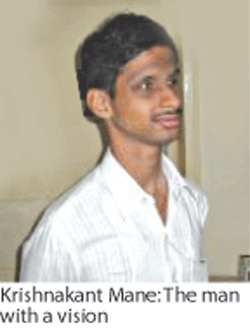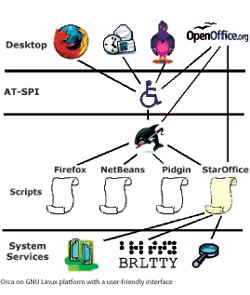
Here do I present the story of a man who has overcome tremendous odds to reach to the highest levels of glory, accomplishment and grandeur. An idealist and a pathfinder, Krishnakant Mane lays the foundation hopes for all the people who live in the shades of darkness. Krishnakant Mane, a social engineer and a Free Software Advocate has brilliant ideas not only for the visually challenged people but also for those underprivileged people who live under the clutches of fear, insobriety and disdain. He provides vision for the blind and hopes for all the physically, mentally and psychologically challenged sections of the community. His is a live story that may well open many drooping eyes that were (till now) innocent victims of clinical insufficiency, functional inability and artless inadequacy.
Since the last five years, Krishnakant has been working tirelessly to uplift and foster the interests of the differently abled people and has been playing an effective role in identifying tools, equipment and the requisite literature to invigorate and enable the disabled. When asked about his main area of focus he says, “I work for education and open knowledge and I am very zealous about knowledge representation, data management and data integration with exclusive use of free software. I work for spreading knowledge awareness mainly among people with partial and multiple disabilities”. His views on open knowledge and his faith in the role of information mechanisms including free software make him a great advocate of free software education. Apart from working on software solutions including software development for the blind, he is working on GNOWSYS for knowledge management. Krishnakant is also contributing ideas for developing tactile display for the hearing and speech disabled.

Mission
As a social engineer, Mane wants to reach out to the differently abled people in the remotest parts of the country with the use of open knowledge resources and free software based technologies.
Mane is working for spreading knowledge awareness mainly among people with partial and multiple disabilities

He says, “How would an average villager use various forms of technologies including ICTs”? When asked about how to establish the connect in the remotest parts of India, he says, “I want to travel to the villages and would like to work as a facilitator and try to create awareness in rural areas. As a facilitator, I would also be able to create technical and social platforms. My physical presence will not only make them aware of the current initiatives endeavoured by the government, the non-governmental agencies and the private players, it will also make them conversant with the tools and technologies that expedite vivid forms of communication and information interchange. However, I can’t be physically present every where so we need to work towards creating more trainers and more supporters in the local areas knowing the native language”.
Early days
He always grew as up in the most usual way. While reminiscing his life as a child and as an adolescent, he adds, “My parents have always urged me to grow up as a normal child and right from my childhood they created circumstances and events that were not only congenial to my mental and psychological growth but also congenial to my entire learning and understanding process. I was put to a regular school named King George High School (presently known as V.M Sule High School) wherefrom I completed my 10th standard. Thereafter, I joined Ruia college, Mumbai wherefrom I finished my +2 and graduation. After that, I successfully completed a three-year course on Professional Diploma in Software Engineering from Datapro”.
Career profile
Presently, Krishnakant is working as a Project Fellow in Homi Bhaba Centre for Science Education (HBCSE) lab with Dr. Nagarjuna of the Tata Institute of Fundamental Research in Mumbai. Before joining HBCSE, Krishnakant worked as an advisor to several state governments in India for creating awareness about accessibility technologies for the education of handicapped people. This apart, he has also been a consultant to several private companies and non-governmental organisations in the early 2000/2005 and helped them to migrate to free software. As a Project Fellow in HBCSE, Mane is trying to provide solutions exchange that contributes towards creating a knowledge networking system. To ensure free learning and sort out accessibility difficulties, Mane is working on a project called SELF (Science Education Learning in Freedom) under the supervision and guidance of Nagarjuna. SELF uses GNOWSYS as a back-end tool. The main aim of this project is to create a comprehensive platform with high quality educational and training materials about Free Software and Open Standards. According to Mane, “The Knowledge Labs in Tata Institute of Fundamental Research is doing extensive research on Free software and education”.
Apart from the research, blogging and helping people on online support groups, Mane is actively involved in teaching. He uses a coordinate system while using the computer screen. Very enthusiastically he submits, “I teach web designing and lay outing to both sighted and vision-less students. My students are all doing well and I have high expectations out of them”.
On ICTs and free software

Mane has clear understanding of the role of ICTs and other forms of cognitive technologies in the lives and living of the differently abled people. When asked about his ideas on differently abled people using ICTs, he says, “Desktops and laptops are pretty accessible to blind people. For people with multiple handicaps and disabilities, no such comprehensive ICT tool or service has been developed. Borderline deceptors who show slow learning and cognisance capabilities are not benefited from ICT tools and technologies. So for the slow learners, I suggest other software (sometimes interactive) with higher and better forms of accessibility features and some augmentative cognitive technologies that foster speech, symbolic communication and neural language. Thus, leaving aside the existing ICT tools, there are so many other methodologies that can be opted for the people with lesser abilities”.
Krishnakant is highly optimistic about Orca. Orca, Mane adds “is a free screen-reader software that ensures better accessibility and operational efficiency for the handicapped and mainly for the visually challenged people. Orca is based on a text-to-speech synthesiser system and runs on a GNU Linux platform with a GNU desktop. Orca helps the blind people to navigate desktop on GNU Linux platform with audio feedback”. Krishnakant, while speaking on Orca, adds, “The source code of the software is available and it being a free software gives the user the freedom to modify and customise the commands in accordance with the needs and requirements. Thus, free and open source software have not only given people complete freedom but also access to high-end resources available on the Internet”.
While deliberating upon Orca, Krishnakant states, “The software Orca is developed in Python language. It works with Mozilla for net surfing and can help a blind person read or write e-mails. The software also helps to create well-formatted documents through tools like open office. It can further facilitate social networking through GAIM (also known as Pidgin) interface. GAIM now called Pidgin is an instant messaging client which even a blind person can use to chat with his friends and colleagues”.
Though Mane has a lot of faith in software and other advanced technologies, yet he doesn’t undermine the human dimension in the process of sharing of knowledge and information, community management and development reorganisation. He affirms, “There is a need to create a people’s network to initiate and implement ICT tools. I have great hopes for the generation to come and the various integrated communication tools will expedite the process of learning, interaction and sharing for the disabled people”.
Conclusion
Mane has clear opinions about free software and strongly critisises the proprietary way of free software. He says, “Free software is not all about cost but about the freedom which every individual is bound to get. One cannot have ease and flexibility with proprietary software because most source codes are inaccessible to the general public. And as the impaired people fall in the lowest rung of socio-economic hierarchy, they are unable to take recourse to the software even if they are resourceful and relevant. Moreover, most of the proprietary software cannot be improvised in accordance with the needs of the disabled”. In a nutshell, Mane is fighting a hard battle for the people with various physical and mental impairments. May Mane’s philanthropic mission as a torch bearer for the differently abled people especially the visually impaired people end up with stupendous success and honour. 
Be a part of Elets Collaborative Initiatives. Join Us for Upcoming Events and explore business opportunities. Like us on Facebook , connect with us on LinkedIn and follow us on Twitter, Instagram.











